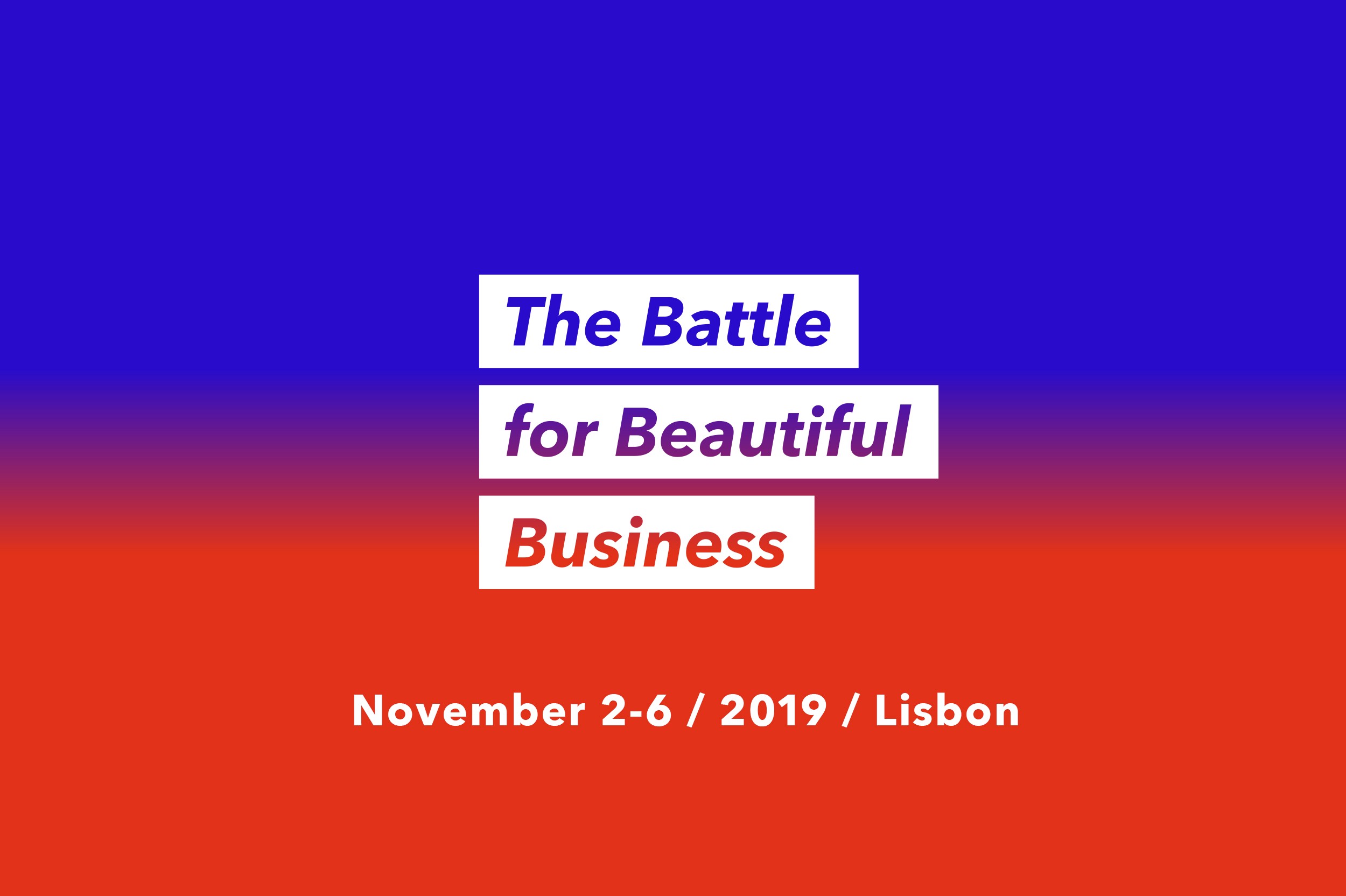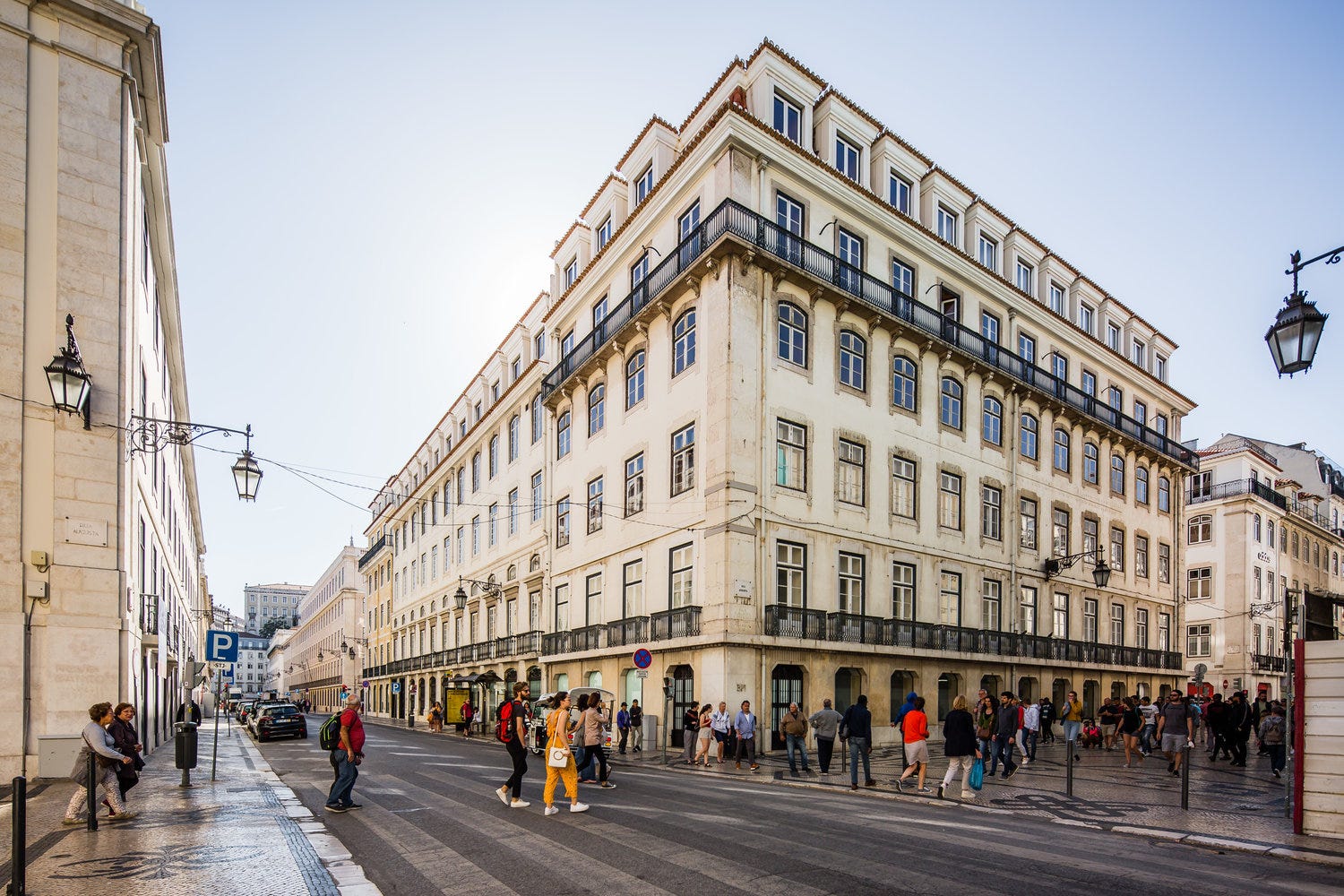The Battle for Beautiful Business
In these sometimes ugly times, we must celebrate ethics, aesthetics, and emotions. Tim will curate the House of Beautiful Business in Lisbon from November 2–6, 2019.

by Tim Leberecht
Beauty is whatever puts me outside of myself,” the writer Pico Iyer told me in our recent podcast conversation, and “a beautiful business is one that is devoted to making this world a better place.”
That also perfectly describes what we are aiming to do with the House of Beautiful Business: creating a transformative experience that connects 500 leaders from business, tech, science, the humanities, and the arts in Lisbon from November 2–6, 2019. On the eve of and during Web Summit, we gather for a multisensory exploration into how we can humanize business by making it more beautiful. The House is the culmination of insights generated at 17 events around the world this year — Chambers of Beautiful Business — and at the same time a departure into unknown territory, all of which has just one simple goal in mind: “to use business to bring out the best in humans,” as my co-founder Till Grusche puts it.
Yet this seems like a daunting task these days. This past week has been particularly ugly: the Amazon fires and devastating climate change forecasts, the Brexit chaos, a continued surge in right-wing nationalism, and the Epstein scandal’s ensnarement of tech elites such as MIT, to name just a few events. In light of these, it may seem counterintuitive, if not obscene, to devote a gathering to beauty, especially to beauty in and through business. Can we afford beauty, you may ask, on a burning platform?
The answer is: we must. Make no mistake: beauty — as in, an appreciation of ethics, aesthetics, and emotions — is not something precious or lofty or luxurious. It is what makes us human, now more than ever. It is the opposite of fear. It is essential and worth fighting for.
Real tensions — and real choices
Our theme for this year’s House, therefore, is “The Battle for Beautiful Business,” acknowledging these tensions and obliging us to not shy away from naming the conflicts that lie at the heart of our increasingly polarized societies:
- Unchecked growth and Silicon Valley-style “blitzscaled solutionism” versus dignity, fairness, and respect for all stakeholders, including the environment and future generations
- Efficiency versus intimacy
- Dataism versus imagination
- Cynicism versus hope
- Reductionism versus diversity
- Paperbirds versus moonshots
- Old power versus new power
These tensions prompt us to face some real choices: Do we want to contain climate change or do we need to begin to design for a graceful ending? Is “human-centered” the path forward or do we need a new religion? Will we enter a new dark age or will we be able to create new narratives, systems, and even new emotions and senses that will lift us to a higher level of collective consciousness, to more inclusive societies, more humane organizations, and a stronger sense of belonging? Will we surrender to the regime of efficiency or can we dream bigger? Will we be able to reform capitalism or will we have to replace it entirely? Are corruption and moral bankruptcy aberrations or the norm among our institutions? How can we drive real change, not just “fake change”? How can we design workplaces that are like gardens, and not machines? How can we lead beautiful and not just productive lives?
5 days, 500 residents, 100 speakers, 60 sessions, and many unexpected encounters
To explore all these questions, ask even more, and — perhaps — find some answers and solutions, allies and friends, the House of Beautiful Business will feature three locations (an Academy, a former Bank, and a Palace); and more than 60 sessions on topics ranging from magic and poetry at the workplace to worker rights, psychedelics, “indigenous AI,” blockchain, and quantum computing.
Among the 100 speakers will be Anand Giridharadas, author of Winners Take All; Ebele Okobi, public policy director Africa, Turkey, and the Middle East for Facebook; Sir Paul Collier, economist and author, most recently, of The Future of Capitalism; Safi Bahcall, new science entrepreneur and author of Loonshots; Alex Weller, the European marketing director of Patagonia; Barbara Martin Coppola, chief digital officer of IKEA; Safiya Umoja Noble, UCLA professor and author of Algorithms of Oppression; Mark Sagar, co-founder and CEO of Soul Machines; Mathieu Lefevre, co-founder and CEO of More in Common; Emily Church, executive director of the Global Learning XPRIZE; Raashi Sikka, head of diversity and inclusion, EMEA for Uber; Yanbo Xue, chief scientist of China’s LinkedIn, Boss Zhipin; Tina Roth Eisenberg, founder and CEO of Creative Mornings; Brazilian filmmaker Estela Renner; cyborg artist Moon Ribas; Robin Carhart-Harris, head of the Centre for Psychedelic Research at Imperial College; Kristina Lunz, co-founder and executive director of the Centre for Feminist Foreign Policy; and Martin Reeves, director of the BCG Henderson Institute, among many others.
In addition, you will meet 400 residents from organizations including Accenture, Ageas, Airbnb, Airbus, Amazon, Bayer, BCG, Beiersdorf, BMW, Boss Zhipin, BPI, Capital One, CARE USA, Daimler, Deloitte, Deutsche Telekom, European Commission, Facebook, Farfetch, Galp, Google, Hubert Burda Media, IBM, IEEE, IKEA, INSEAD, Korn Ferry, LinkedIn, Lufthansa, Magnum Photos, Microsoft, Nestlé, Netflix, Novo Banco, Otto Group, Porsche, Salesforce.com, SAP, Sennheiser, Shenzhen Open Innovation Lab, Siemens, Sky, SYPartners, TED Conferences, Uber, UBS, Union Square Ventures, Wikimedia, and XING, among many others.
The full program will be released end of September, but you can find a high-level overview here.

The House is not your typical conference. It’s a full-body, wholehearted immersive experience that engages you not just intellectually, but also emotionally. We’ll start with Mystery Meetings, and on the first day you’ll have a chance to awaken all your senses through hypnosis, constellations, improvisation, and meditation, as well as a special fitness training camp. Throughout the week, there will be talks and debates, in-depth conversations and games, DJs and string quartets, a music and photo studio, exhibitions and installations, a rowdy team battle and a silent party. We’ll celebrate the Lisbon Dinner Festival on Tuesday night (November 5) with 15 dinners hosted by local residents and organizations across town. Our “director of danger,” Mykel Dixon, and former School of Life managing director Morgwn Rimel will run a Dangerous Ideas speed-learning exchange; we will visit a eco-conscious farm near Lisbon, the Museum of Money, and the vaults and their secrets in the former bank; play the Beautiful Game (soccer/football) on the training grounds of Benfica Lisbon (yes, we like Sporting Lisbon, too). Finally, we’ll release our first Book of Beautiful Business, an anthology of writings on reimagining business, at the House.
Hurry up if you’d like to join! There are only a few passes left.
Need permission from your boss, partner, or conscience? We got you covered.
Or just watch/forward these videos below.
See you in Lisbon!
The House of Beautiful Business is a global think tank and community to humanize business in the age of machines. Our annual flagship event takes place in Lisbon before and during Web Summit in November. Bringing together business leaders, founders, technologists, artists, philosophers, and scientists as “residents,” the House of Beautiful Business — now in its third year — serves as an interdisciplinary, playful, and immersive forum for crafting new visions for the future of our societies at human scale. In addition, several smaller events around the globe (“Chambers of Beautiful Business”) serve as community touchpoints throughout the year. The House of Beautiful Business also runs a media platform which includes the online magazine, “Journal of Beautiful Business”, a monthly newsletter, “Beautiful Business Letters”, and regularly produced video content. The House of Beautiful Business is a creation of The Business Romantic Society, in collaboration with the BCG Henderson Institute, T-Systems, Galp, Porsche, Essentia, Magnum Photos, IEEE, Indeed Innovation, and TAP Portugal.